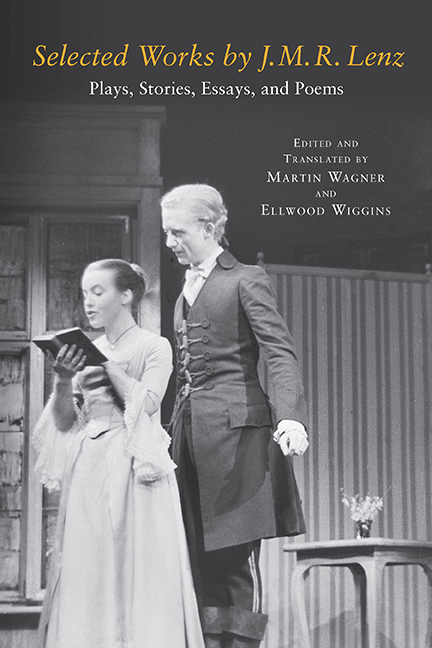Book contents
- Frontmatter
- Contents
- A Note on the Translation
- Introduction
- Part One Plays
- Part Two Stories
- The Hermit: A Pendant to Werther's Sorrows By the Deceased Poet Lenz
- The Country Pastor: A Story By Jakob Michael Reinhold Lenz
- Part Three Essays
- Part Four Poems
- Chronology
- A Note on the Currencies in Lenz's Works
- Selected Bibliography
- Index
The Country Pastor: A Story By Jakob Michael Reinhold Lenz
from Part Two - Stories
Published online by Cambridge University Press: 27 March 2020
- Frontmatter
- Contents
- A Note on the Translation
- Introduction
- Part One Plays
- Part Two Stories
- The Hermit: A Pendant to Werther's Sorrows By the Deceased Poet Lenz
- The Country Pastor: A Story By Jakob Michael Reinhold Lenz
- Part Three Essays
- Part Four Poems
- Chronology
- A Note on the Currencies in Lenz's Works
- Selected Bibliography
- Index
Summary
First Part
I shall tell the story of a man who never would have imagined being carried to the stars on the wings of poetry.
Mannheim was sent by his father, a clergyman in Thuringia, to the university. He, the son, had devoted himself to the clergy, not so much to please his father, but because he felt born for it. From childhood, all the pleasures he sought were the pleasures of an old man, and he never felt better than in a society in which one smoked tobacco and debated learned matters. Of his own volition, he would copy out his father's sermons and deliver them—having first donned his father's wig and coat— secretly behind locked doors to an audience of wig stand and wardrobe. He collapsed half aswoon once when his father eavesdropped on him in the company of a large group of country pastors and suddenly opened the doors with the master key.
This delight of the good old man, however, was bitterly spoiled. He was a friend of dogmatism and orthodoxy and had been very diligent in this matter with his young Johannes. In these frivolous times, he feared nothing more than that his son, once removed from the paternal eye, might be infected by the free-thinking and Socinian opinions prevailing in the institutions of higher education. For although he had never read Socinus and knew him only from Walch's list of heretics, he found him so abhorrent that he called any opinion not concurring with his own “Socinian.” He therefore took all possible precautions and urged his son to attend the lectures of those professors whose lectures he had attended himself, or of whom he was at least convinced that they followed in the footsteps of their predecessors. At the same time, he conjured up all the terrifying images in his imagination—and which, at the time, made a great impression on the young fellow—to warn him against all societies of young people, particularly of those who were invested in the fashionable branches of learning. He recommended the company of his professors, painted the prospect of his return in the most charming colors, and even granted some space in the latter to the beautiful eyes of his provost's daughter, who reportedly inquired so very frequently about the little Johannes.
- Type
- Chapter
- Information
- Selected Works by J. M. R. LenzPlays, Stories, Essays, and Poems, pp. 214 - 254Publisher: Boydell & BrewerPrint publication year: 2019

